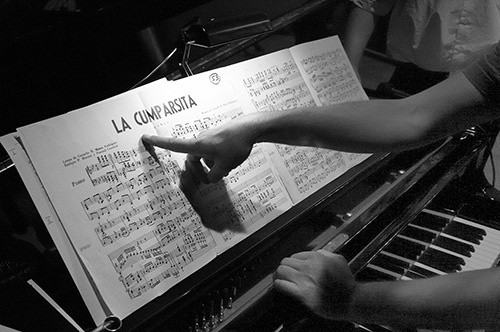The gift of music is one of the best lifelong gifts a parent can give his or her child. That is why it’s equally important to ensure your gift is packaged right so it can have the positive impact it should. A poor-quality music teacher will seriously water down your child’s musical experience and could even jeopardize it.
Choosing your child’s music teacher is not something to be done in a hurry. Take your time, think about what you want your child to experience and make a list of your requirements. This will help you remain clear on what you can or cannot compromise on in terms of teacher qualities.

Here are a few you should definitely have on your list, but you can also add your own. Remember though, no one is perfect, so although it’s possible to find a good teacher, the perfect teacher may be unavailable if he or she exists.
- Qualification and Experience
Naturally, you want a teacher with sufficient education to give your child a worthwhile music education. Additionally, you also need to find out about the teacher’s experience, both as a teacher and musician, to determine whether they match your objectives for your child’s musical education.
Identifying students’ emotions, applying them to thinking and problem solving, and regulating them for prime learning—the hallmarks of high EQ— are essential skills.
If a student is acting out, a great teacher can identify the root cause — Is the student tired? Did they experience a traumatic event at school? Do they simply need some physical activity? As any M.D. will tell you, once the cause is correctly identified, the symptoms are infinitely more treatable.
A student who connects personally with their instructor is much more likely to produce great work and exceed their own expectations. Via Piano Power
- Emotional Intelligence
In simple words, individuals with emotional intelligence are aware of their own emotions as well as the emotions of others. This is a vital trait for any music teacher, but especially so for those giving private

lessons because they interact closely with parents and students.
The best musicians do not necessarily make the best teachers; nonetheless it is important that the person you entrust with guiding you or your child through those crucial first musical steps has a good mastery of their instrument. Look for a teacher who has achieved a high standard of formal qualification such as a degree or diploma in music.
But don’t just look at what instrument they are qualified in, but also the style as there is a world of difference between, say, jazz and classical.
Also, search for those who have experience of teaching for the age group you are looking at whether children or adults, as trying to get a grownup to do something often requires completely different approaches to youngsters. Via Chamberlain Music
- Style of Testing
Many people view the old style of testing and classical exam to be stifling and stressful, and with good reason.

It’s important to choose a teacher that shares your views as far as their approach to teaching and testing is concerned. Find out how the teacher will evaluate your child’s progress and what type of instructional material will be used.
- The Nitty Gritty
It’s important to be on the same page with a prospective teacher in terms of what is expected by both parties. This is the only way to be sure that you’re entering into a fruitful relationship.
You need to find a music teacher who is able to fit into your or your child’s life. As such you need to consider the following:
- How many lessons at a time do you have to book?
- What is the cost per lesson?
- Are lessons to be paid for per session or in advance?
- How long are the lessons?
- Does the teacher come to you, and if so do you have a practice space?
- If you have to travel to them – where are they and how long does it take to get there? Also, will you/ your child be the only pupil during the session?
- What is their cancellation/refund policy?
- How much practice is expected between lessons? Via Chamberlain Music
Always keep in mind that the teacher will be a great influence on whether your child enjoys the music lessons and will continue with them long term. When you know what you’re looking for in a music teacher, you should have no problem choosing one.
Featured Image: Image Credit
guest at my mom’s funeral: elementary school music teacher Betty Krasnapoler. She gave me a cello. Rest is history. pic.twitter.com/2huZYNSPnh
— Howard Fineman (@howardfineman) July 1, 2016
“im going to quit this..”
crowd: “boo”
“-‘ang on im telling a joke , i going to quit this and be a music teacher in my kids school”— Adelelive2016 (@adelelive25) July 6, 2016
Related Articles:
What to Look For in a Music School or Teacher for My Child
Finding the right music teacher for your child is one of the most important choices you make. It sets the stage for whether or not your child will enjoy their music lessons, and that is key to helping them continue with their music lessons over the long haul.
Ensure the Music School’s Teaching Philosophy is in Line With Your Goals
Nowadays, many people are moving away from the old-style of testing and classical exams. This is because many children find that style of lessons to be stifling, stressful, and not enjoyable. Which is the exact opposite of what you hope to accomplish with lessons, right? Via Capstone Music
How To Choose a Piano (Music) Teacher For Your Child- Some Practical Tips
I haven’t met a child yet that is not interested in music. If you place an instrument in front of a kid, he or she is probably going to experiment with it and create sounds, so, I believe it is important to exploit this natural creativity in a manner that encourages children to be musical. Víctor loves music. Since he was little, he had very specific requests for the songs that I played in the car; and he’s loved sitting down in front of the piano for 20 minutes or more singing (or screaming) indecipherable tunes since he was 2. He also loves drumming as hard as he can, every morning, at 7am, and I am sure our neighbors love that!
Anyway, this kiddo turned 4 years old last July, and, after years of toddler music lessons he was ready for something more “professional,” so I started looking. Via Jest Cafe
Tips for Music Teacher Job Interviews
Are music teacher job interviews somewhere on your horizon? If so, here are 7 suggestions for what you can do now while you are still in college and have access to great resources.
1. Market your pre-K – 12 general proficiencies in music education. Don’t just focus on specific training on your major instrument or voice. Don’t “label” your abilities, put yourself out there as a specialist, or sell yourself short. You should be able to teach general music at any grade level, lead a jazz rehearsal, design a lesson on folk dancing, conduct choir, direct a musical, chart a marching band halftime show, prepare students to take the music theory advanced placement exam, and start a string program. Via Majoring In Music

